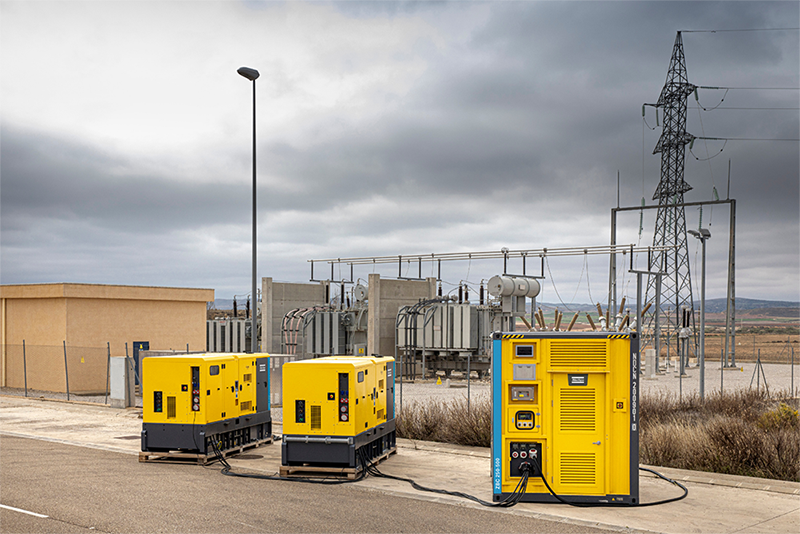
Productivity on a quarry site is vital to completing a project within budget. This is especially important in today’s economic climate where quarrying companies are also under increased pressure to operate as cost-effectively as possible.
The ability to work efficiently and finish a project on – or even ahead of – schedule can ultimately help improve the bottom line.
A critical component of any site, and one that has a significant effect on productivity, is power. Without a good, reliable source of power, quarry workers risk unwanted downtime which can set their project back. Traditionally, diesel generators have been the power source. However, in recent years, lithium-ion battery energy storage systems (ESS) have been developed to address the need for more environmentally friendly and sustainable equipment.
Barbara Gregorio of Atlas Copco Power and Flow says these energy storage systems can play a pivotal role in helping sites to increase productivity. They can assist rental companies increase their profitability, and quarry operators to make cost savings, while contributing to a lower total cost of ownership (TCO).
“One factor that has a significant impact on productivity is the noise levels of the equipment, says Gregorio, who is divisional product marketing manager Innovative Energies and Digital Solutions at Atlas Copco’s power and flow division. “Noise is a major environmental problem and as such there are regulations that stipulate maximum noise levels to address the effect on the hearing and general well-being of employees and visitors of a site, and the environmental noise that may affect people living in the vicinity of a quarry and other adjacent potentially noise-sensitive properties and areas outside a site.”
Generator-powered solutions with engines inherently make some noise and there is no way of eliminating this entirely. In contrast, batteries operate silently, and so energy storage systems are noise-free. Gregorio says this has major benefits, helping operators to comply with regulations and enabling them to extend their working day.
Energy storage systems can also be used to increase productivity on remote sites or applications where grid installations are not stable as there is no need for refill generators. Atlas Copco says its lithium-ion ZenergiZe range of energy storage systems is an ideal solution as a source of energy backup to ensure continuous production for industries running 24/7 that cannot afford the consequences of blackouts.
“Energy storage systems can help operators to increase productivity during electricity peaks,” Gregorio states. “They can be used in parallel with diesel generators (in a hybrid mode) in this case, so there is no need for sites to reduce activity to avoid exceeding the grid limits. As the energy storage solution provides a separate energy source to the grid, it enables smart load management, and work can continue even during peak electrical demand.”
She adds that there are further benefits of hybrid setups. By operating an energy storage system in combination with a generator means operators can use a smaller-sized generator, and downsizing the generator means maintenance can be kept to a minimum and ensures the generator works at its optimal point.
Productivity can also be increased by a reduction in maintenance. If equipment needs regular servicing, this downtime can lead to unwanted and costly stoppages.
“That’s where lithium-ion battery energy storage systems can have a significant positive effect,” says Gregorio. “For example, in normal operating conditions, these batteries have a lifespan of 40,000 hours and an overload capability of 200 percent. Atlas Copco energy storage systems have also been specifically designed to operate in high and low ambient temperatures, from -15C to +50C. Their heating, ventilation and air conditioning systems help minimize maintenance needs during the battery energy storage systems’ lifecycle, helping operators achieve optimal uptime.”
In addition to improved productivity, Gregorio says there are financial benefits to both rental companies and end users in terms of cost savings to be made, profits and return on investment.
Offering an efficient hybrid alternative to using a large generator for variable loads is the combination of Atlas Copco’s Energy Storage Systems (ZBP and ZBC models) and the company’s latest QAS+ generators. Compared with a generator of 650 kVA, working as a standalone solution, Gregorio says that a ZBC250-575 with a QAS+ 325 in hybrid mode can reduce daily fuel consumption by up to 80%. It is equivalent to approximately 200 tons of CO2 during their working life. “This has a significant impact on productivity, boosting it by 50% and keeping the solutions’ total cost of ownership to an absolute minimum,” she says.
Atlas Copco’s energy storage systems are designed to optimise the generator’s performance, extending its lifespan by up to 15% and cutting in half any maintenance and overhaul requirements.
Atlas Copco says the introduction of lithium-ion energy storage systems such as its own range is having a real, positive impact on business for both rental companies and end users alike, enabling them to improve productivity. Additionally, users can benefit from minimising environmental impact with low cost of ownership.
“These novel energy systems are delivering zero CO2 emissions, zero NOx pollution, zero noise, with virtually zero maintenance, supplying reliable energy without compromise,” says Gregorio.








